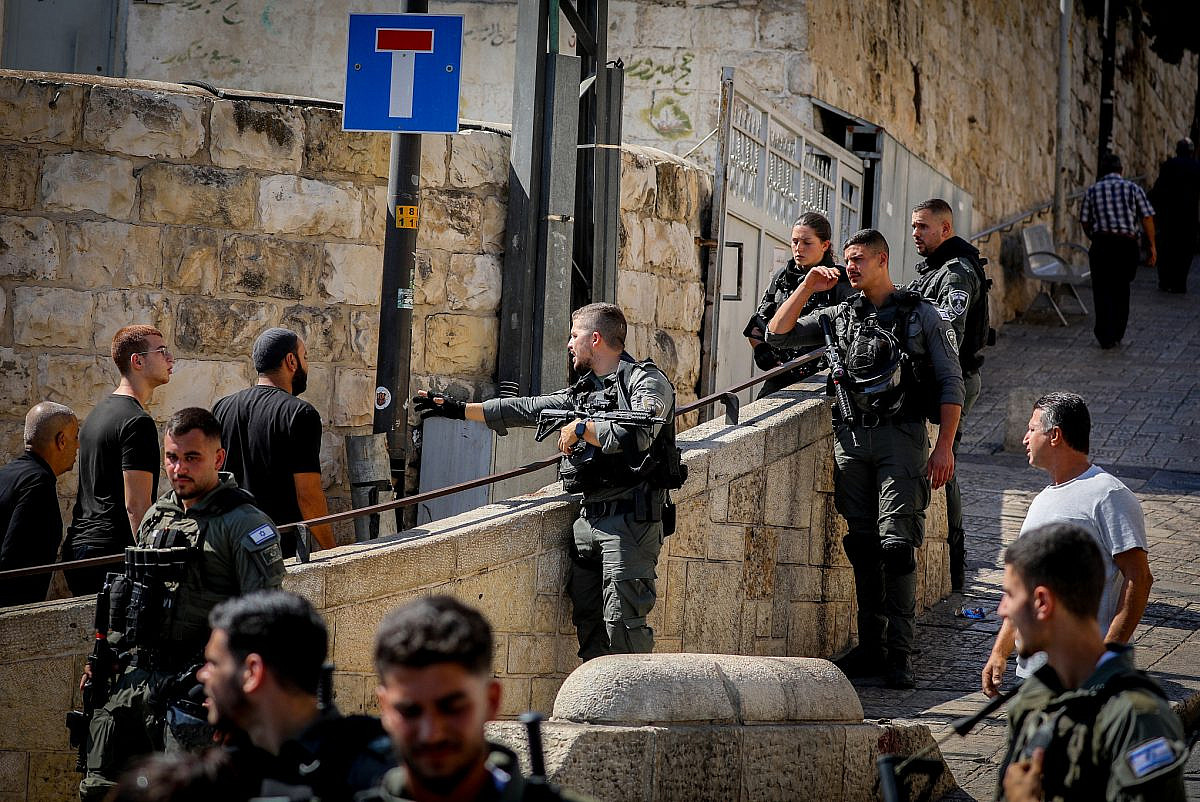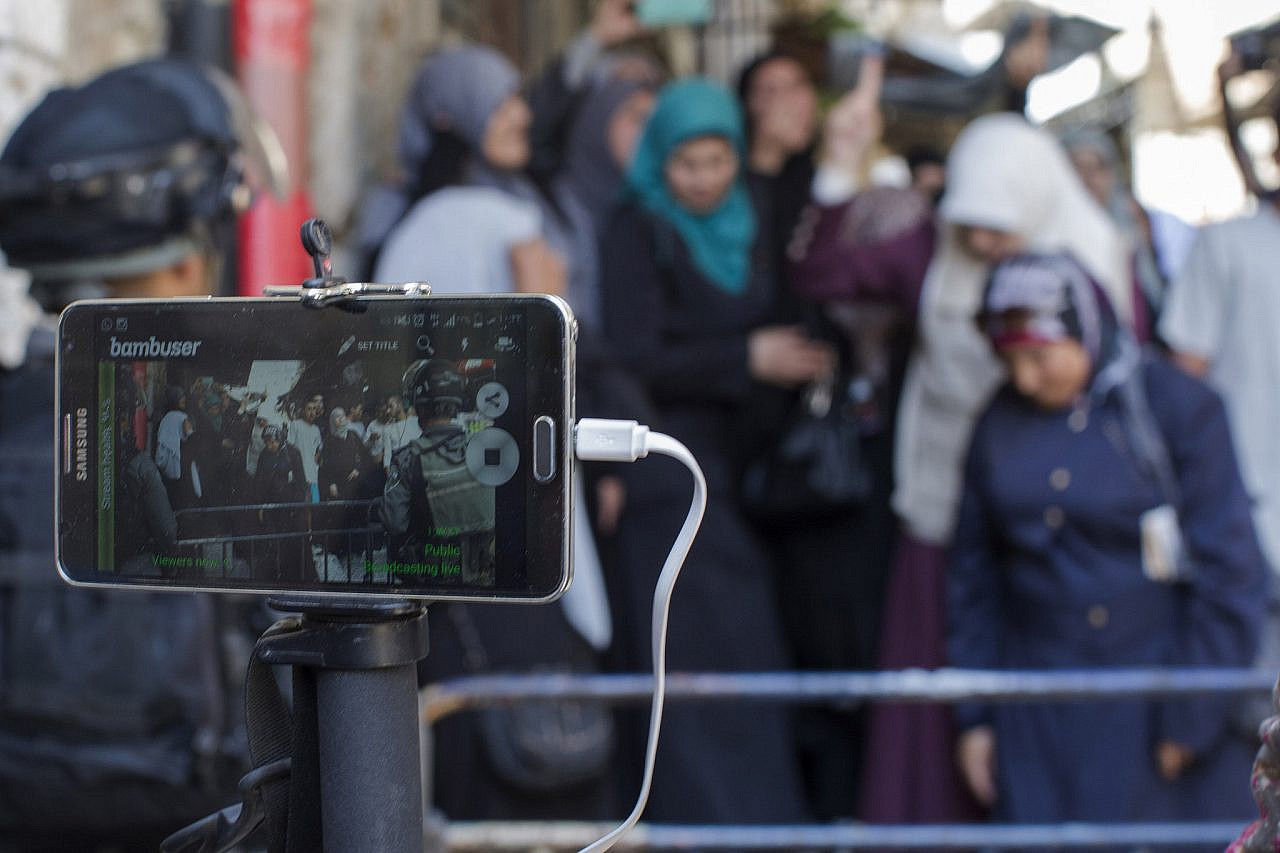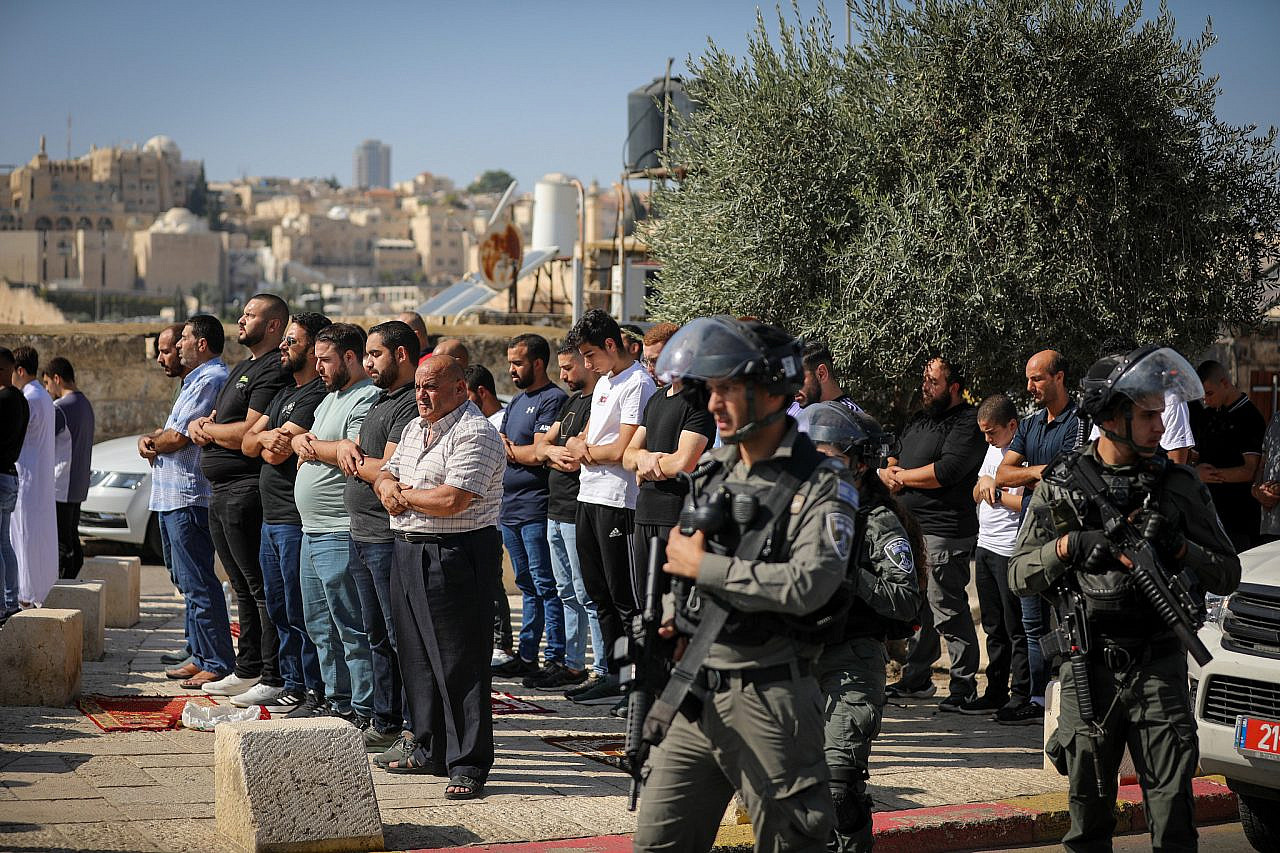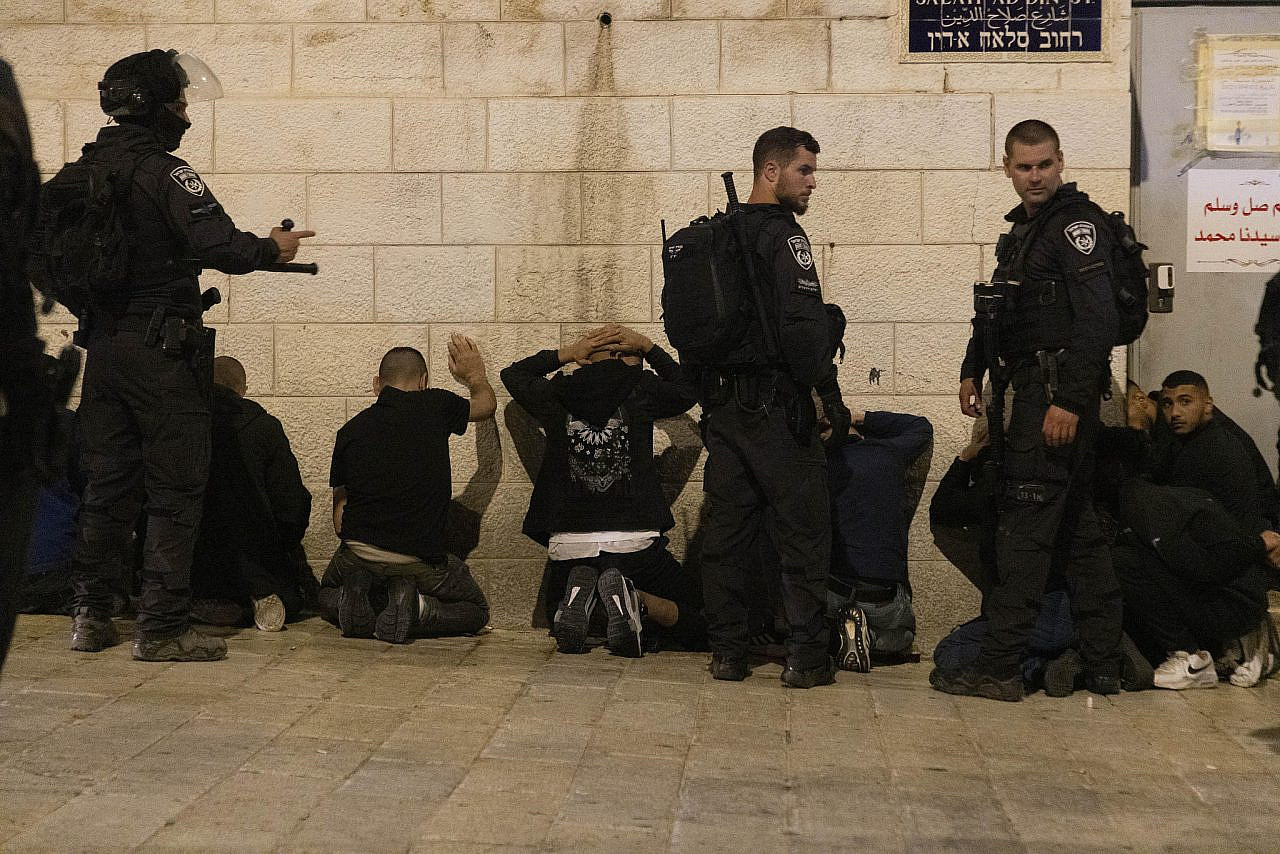Israel’s ‘thought police’ law ramps up dangers for Palestinian social media users
Rights advocates warn the draconian law will enable unprecedented surveillance, raising Palestinian fears of arrest for their online activity.

When Ahmed graduated from an Israeli college with a degree in computer science earlier this fall, he was eager to start job hunting. He planned to attend careers fairs and networking events in Tel Aviv with his classmates and to scour LinkedIn for new opportunities at prominent technology firms. But Ahmed, who is in his mid-20s, has rarely ventured far from his home in occupied East Jerusalem since October 7.
In an interview with +972, Ahmed, who spoke on the condition of anonymity and asked that we refer to him using a pseudonym, said that in recent weeks Israeli police have been stopping Palestinian Jerusalemites on the street and searching their phones, culling through their Telegram news channels or WhatsApp chats. Ahmed said he has experienced unprecedented levels of police harassment and has given up on searching for jobs, let alone going to work in West Jerusalem’s hospitality industry. “When I leave the house, I delete Instagram, I delete Telegram, I archive all my chats,” he told +972. “I don’t know what [the authorities] will flag now.”
In the weeks since Hamas’ October 7 massacres in southern Israel and the start of Israel’s bombardment of the Gaza Strip, there has been a dramatic increase in surveillance and political persecution of Palestinians with Israeli citizenship and Jerusalem residency. Emergency wartime regulations, introduced by the Attorney General’s office and the National Security Committee, have given Israeli police and other security bodies expansive and unchecked powers.
Amid a spike in arrests, indictments, suspensions, and job terminations, many Palestinians have stopped using social media altogether, deleted news and messaging apps, and started turning off their phones while socializing for fear of being surveilled. Now, the stakes of using technology have been raised even higher.

An activist uses a cellphone to live stream as Israeli police forces block Palestinians at an entrance to the Al-Aqsa Mosque compound in Jerusalem’s Old City, July 26, 2015. (Faiz Abu Rmeleh/Activestills)
On Nov. 8, the Knesset passed an amendmentto the Counterterrorism Law, introducing a new criminal offense — “consumption of terrorist materials” — that carries a maximum penalty of one year in prison. Its proponents promise that the measure will combat “brainwashing that may produce a desire or motive to commit terror,” but human rights advocates and legal experts are describing it as a bid to “penalize thoughts and feelings” and one of the most intrusive and draconianmeasures ever passed by the Israeli parliament.
The Association for Civil Rights in Israel (ACRI) warned that the legislation has no precedent in any democracy elsewhere in the world. And while the amendment is set to expire in two years, legal advocates worry it will become permanently enshrined in Israeli law.
Dangerously ambiguous
Among many provisions, Israel’s Counterterrorism Law, passed in its original form in 2016, criminalizes incitement or sympathy with a terrorist organization. Yet legal experts have long warned that “incitement,” “sympathy,” and “terrorism” are so broadly defined that the law has enabled alarming rates of surveillance, censorship, and detention of Palestinians, including those in the West Bank, especially for their online activity.
The Haifa-based legal center Adalah described the law at the time as a “discriminatory” and “politically motivated” means of violatingPalestinian freedom of expression. Digital rights advocates further say the law has led to alarming rates of censorship and self-censorship among Palestinians across Israel and the occupied territories.

Israeli police watch on as Palestinians pray in the streets of the East Jerusalem neighborhood of Ras El Amud, November 3, 2023. (Jamal Awad/FLASH90)
The new amendment passed earlier this month significantly expands Israeli authorities’ surveillance and policing powers. In a bid to crack down on so-called “lone wolf terror,” the legislation criminalizes the “systematic and continuous consumption of publications of a terrorist organization under circumstances that indicate identification with the terrorist organization.” In this case, the organizations in question are limited to Hamas and Palestinian Islamic Jihad.
First drafted by Israel’s Justice Ministry a year and a half ago, the amendment has garnered significant pushback among Palestinian lawmakers and human rights advocates, in large part because its key terms once again lack clear definitions. “What does ‘continuous’ mean? What does ‘systematic’ mean? What does it mean that you ‘identify’ with the organization? It’s not clear what the law considers to be a crime,” Mysanna Morany, an Adalah attorney, told +972.
ACRI warned that this ambiguity gives law enforcement authorities, as opposed to courts, broad discretion in interpreting the law’s meaning and deciding how it will be implemented. It also puts lawyers in a quandary, explained Morany, because they “can’t really give any consultation to the public on how to act and what is considered to be a crime because nothing [in the amendment] is defined.”
Moreover, Morany suggested that the amendment goes against a fundamental principle of criminal law, which holds that thoughts alone cannot constitute a criminal offense. “Usually, law criminalizes action or the intent to take action — doing something or preparing to do something that leads to specific results. But this law criminalizes mere thoughts, or even the intention to have thoughts. How is that supposed to be applied?”Indeed, when the bill was introduced last month, critics dubbed it the “Thought Police Bill” in a nod to George Orwell’s “1984.”
‘It’s about creating an internal enemy’
The amendment’s passage followed a month of rampant surveillance, invasive policing, and criminalization of Palestinian speech by Israeli authorities. Adalah told +972 that it recorded at least 214 interrogations, arrests, or indictments of Palestinian citizens of Israel in the four weeks following October 7.

Israeli forces attack the funeral of Walid Sharif in Jerusalem after first blocking participants from marching out of the Old City, May 16, 2022. (Oren Ziv)
“People are saying it’s like the atmosphere of the military rule that our parents lived under in the ‘50s and the ‘60s,” said Nadim Nashif, executive director of the Palestinian digital rights organization 7amleh, referring to the 18-year period during which Israel imposed martial law on the Palestinians who remained inside the new state’s borders following the Nakba of 1948; policies at that time included curfews, restrictions on movement, suppressed freedom of expression, and surveillance. “With the severe restrictions on our rights now, people feel that history is being repeated, but in a digital way.”
“This kind of repression has been happening for a long time; we know because we’ve experienced it before,” said Reem Hazzan, a political activist with the socialist, Arab-Jewish Hadash party. “But the [authorities] have new technology they can use to persecute people for their opinions. A majority of people today are asking to stop the war — that’s not a call to incite violence. It’s the opposite.”
In her book on the period of martial law that governed Palestinian life until 1966, the historian Shira Robinson writes that the severe restrictions on Palestinian citizens “created a culture of racial profiling and served to criminalize the Palestinian public at large” in a bid to shore up a cohesive Israeli national identity. Hazzan told +972 that the new law serves a similar purpose: “Once again, it’s about creating an internal enemy in order to strengthen the Israeli public’s unity,” she said.
Nashif said the new legislation was already having a resounding effect on Palestinian citizens of Israel. “There’s a lot of fear. People aren’t just afraid of going out to demonstrate against the war. They are afraid of even speaking to one another.”
He explained that friends of his now switch their phones into airplane mode when they meet at bars or cafes. “They’re afraid and confused,” Nashif said, emphasizing that the move has had a “chilling effect” on Palestinians’ fundamental rights, like freedom of expression, movement, and protest.

Palestinian citizens of Israel march as they take part in protest marking the 21st anniversary of the October 2000 riots, in which Israeli police killed 13 Palestinian citizens, Sakhnin, October 2, 2021. (Alon Nadav/Flash90)
The chilling effect is not limited to Palestinians with Israeli citizenship. Jamil, who works in Israel’s civil society sector and spoke on the condition of anonymity, often splits his time between Ramallah and Jerusalem. He told +972 that most of his friends who work in West Jerusalem’s hospitality sector have quit their jobs, unwilling to travel far beyond their neighborhoods for fear of police harassment.
Likewise, Jamil said he had heard of Israeli soldiers stopping Palestinians at checkpoints or temporary roadblocks in the West Bank to look through their phones — reports that have been corroborated by international media and local human rights groups. “Everyone is changing their routines: they are staying home or not going to work. If someone in my family has to run an errand, they delete their apps, they delete the news,” Jamil said. “That’s a common narrative, and it’s a scary narrative because the military or police can unlock our phones and decide to arrest us.”
Lawyers say the fear is warranted. To enforce the new legislation, authorities will have to prove that suspects consume social media or news in such a way that indicates they sympathize with a terrorist organization. “Imagine how much surveillance is needed to prove that,” Morany said, indicating that troves of personal information could be mined to demonstrate sympathy. “How will it be done? How much will be enough? Will they surveil phones five hours a week, or five hours a day? Just imagine what kinds of surveillance will be needed to implement such a law.”
Making the temporary permanent
In comparison with those in the West Bank and East Jerusalem, Palestinian citizens of Israel previously enjoyed relatively stronger privacy protections. However, surveillance and repression has intensified in recent years, especially since the Palestinian uprising of 2021, often referred to as the Unity Intifada. Since then, indictments of Palestinian social media users under the Counterterrorism Law have surged. Even before the current war, legal experts said the trend constituted a systemic restriction of Palestinian freedom of expression.
Yet new bills being pushed through the Knesset threaten to erode what remaining rights Palestinian citizens have. The recent amendment joins a host of other new pieces of legislation that commentators say will single out Palestinians. Earlier this month, the Knesset passed a bill that gives the army, the Mossad, the Shin Bet, and the police access to citizens’ biometric data and private security cameras. Another draft law threatens to strip those convicted of supporting terrorism of their citizenship.
The Knesset also has a track record of using the guise of “temporary” laws and emergency to ram through controversial bills, making them de-facto permanent by renewing them every few years or by eventually enshrining them in Israel’s legal code. “Things that are becoming the norm now, we fear will continue to be the norm after,” Morany said.
Adalah is preparing to petition the Supreme Court to challenge the law, but if that effort fails, activists like Hazzan worry that Jewish Israelis will simply turn a blind eye to the rollback of Palestinian citizens’ rights. She feels that concern for the war has drowned out Jewish citizens’ commitment to opposing the anti-democratic assault on the judiciary led by the far-right government over the past year, which brought out hundreds of thousands to demonstrations each week until October 7.
“We [Palestinians] know Israel isn’t a democracy, and lots of Israelis know it too since they were in the streets protesting for it — but this war has shut down all criticism of the government,” Hazzan said. “We know this won’t be over until the government and the policies change. But the way things look right now, that won’t happen for a long time.”


No comments:
Post a Comment